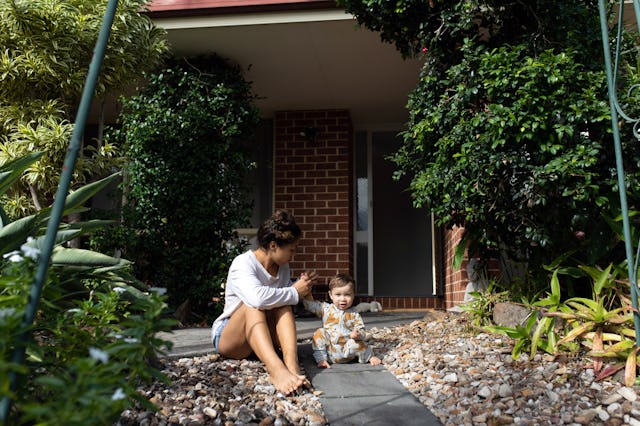I Preach Body Acceptance. And Then I Had A Baby.
Thirteen or thirty, having a body that’s changing is hard.

Today is publication day for my debut graphic novel, Smaller Sister, which is targeted to preteens and is all about the joy and importance of accepting your body exactly like it is. When I started writing this book I was still more than two years away from becoming a mom. Now, as it finally hits stores, I am six months postpartum, and I find myself in the strange position of trying to reckon with my own book’s message of body acceptance all over again.
Smaller Sister is a fictional story based on my experience forming my own self-image in the wake of my older sister’s eating disorder. The book’s main character, a middle schooler named Lucy, struggles with disordered eating in response to social pressure. She faces unrealistic self-expectations of how she thinks her body should look, and it is only when she learns to treat herself with kindness that she is able to see and value herself in a new light.
I wrote the script (which is the text of a graphic novel that resembles a screenplay) in 2019 when I was 28. In that stage of my late twenties, I was mostly at peace with my adult body. I was maintaining the somewhat balanced routines that I’d been building since my less-stable post-college years, and I felt all right about the person I saw in the mirror every morning. But graphic novels take a loooooong time to make. By the time I turned in the final art to my publisher in mid-2021, I had a whole bunch of new feelings about this body of mine — mostly because I was five months pregnant.
Today, as Smaller Sister hits the shelves, my sweet son is exactly six months and one day old. In the time between when I first had the idea for this book and now, I built a whole human. I gnawed on ginger chews for morning sickness while I sketched and squeezed in prenatal yoga classes before workdays spent inking final art. Around the time I started thinking about promoting my book, I had a C-section. And while I’m promoting my new book, I am talking a lot about the main takeaway I want for its target audience of 10-14-year-olds: that seeking to find peace and camaraderie with the body you live in every day can be so much more satisfying than seeking perfection. Meanwhile, my postpartum body is rearranging itself and recovering from major surgery while I keep this brand-new person alive. It’s a lot.
I’ve heard pregnancy called a second puberty, because of the major physical and hormonal changes that your body endures, and that was true in my experience. The changes in my body — wider hips, larger breasts, strange hair in new places, fluctuating skin — felt acutely like what I experienced at twelve or thirteen. (Except the boobs! Those never showed up for me the first time around.) And postpartum, that same unfamiliarity with my reflection and uneasiness in my own skin returned, too. It’s not that I dislike the skin I’m in — I’m able to look at myself through a more mature lens, certainly, than I could when I went through puberty nearly twenty years ago. But, as in puberty, some of the ways my body has changed are permanent, and I’m just not acquainted with this new me yet.
Even when old clothes fit, they don’t feel quite the same. When I exercise, my weight feels differently distributed. And the curve of my stomach over my incision scar kinda feels like it's part of someone else’s body. And when it comes to talking about Smaller Sister, I’ve sometimes felt guilty and fraudulent. Is it disingenuous to have written a book about confidence and loving yourself for who you are instead of what you look like when clouds of self-negativity are gathering in my own mind? Who am I to preach self-love when I can’t even love myself perfectly?
But then again, maybe this is EXACTLY what Smaller Sister is about, and I’m just addressing a new facet of that same unrealistic quest for perfection. As a preteen, I felt pressure to make myself look like my idealized image of perfection. Now, as a new mom, I feel pressure to perceive my body as perfect just the way it is, regardless of how I look. But sometimes, I just don’t. I know I’ll be happier if I can accept those gray clouds of negativity for what they are and trust they’ll pass eventually, but that takes patience, and patience is frustrating and humbling.
Thirteen or thirty, having a body that’s changing is hard. Having a body at ANY age or stage is hard, period. So maybe that’s where I can turn to my own book for guidance. In Smaller Sister, Lucy learns to take her relationship with her body day by day, and to treat herself gently. Taking the same approach as an adult isn’t a step back — it’s just another evolution.
So this is my reminder to myself that it’s okay to not feel quite right in my own skin some days. It's going to take time for me to become acquainted with my postpartum one. But I’m looking forward to getting to know her.
Maggie Edkins Willis was born in St. Louis, Missouri and grew up in southern Maine. She designed and art directed books for children's publishers for seven years before embarking on a career crafting stories of her own. She now lives in Princeton, New Jersey with her husband, a college football coach, and their husky mix, Mozzarella. When she's not writing or drawing, you can usually find her reading, running, or botching muffin recipes. Her debut graphic novel, Smaller Sister, is based on her own experience as the youngest of three sisters.
This article was originally published on